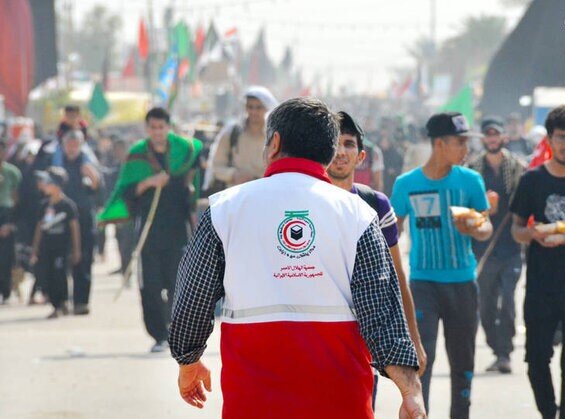Tehran to host third intl. congress on "Health in Arbaeen"

TEHRAN – The third international congress on "Health in Arbaeen" will be held in Tehran from August 2-4.
The congress aims at reviewing the weaknesses and shortcomings of the health sector in the great Arbaeen march in previous years and providing the necessary solutions.
Guests from some 40 countries including Iraq, Lebanon, the United States, England, Pakistan, and Bahrain will attend the congress, IRNA quoted Abdorreza Pazoki, the chairman of the congress, as saying.
The congress also aims to strengthen inter-departmental coordination and synergy of service providers in the Arbaeen trek to reduce the obstacles in providing health services to the pilgrims.
The event will be held by the Iranian Red Crescent Society in cooperation with the Iraqi Red Crescent Society and the Emergency Organization.
The Arbaeen pilgrimage, which is one of the largest religious gatherings in the world, comes 40 days after Ashura, the martyrdom anniversary of Imam Hussein (AS), the third Imam of Shia Muslims, and the grandson of Prophet Muhammad (PBUH).
Each year, a huge crowd of people flocks to Karbala, where the holy shrine of Imam Hussein (AS) is located, to perform mourning rituals.
This year Arbaeen falls on September 6.
This huge religious event will be held with the presence of more than two thousand participants from various fields of medical sciences and Red Crescent societies, Pazoki said, adding that challenges, harms, and health hazards during Arbaeen will be discussed.
Iran is one of the top five countries in the world in terms of primary health care, and during Arbaeen, all diseases and hazards in the health field, such as dust and natural disasters, will be identified and informed to the pilgrims, he noted.
He went on to say that last year, more than 23 million people, from babies to the elderly, participated in Arbaeen, and even special patients, including kidney, diabetic, and transplant patients participated and were provided with different services.
Considering the hot season during Arbaeen, the health of food for pilgrims should be given more attention and planning should be done to provide food services with care to special patients, Pazoki stressed.
Regarding personal and public health, suitable solutions for pilgrims should be on the agenda, and for the treatment of skin, muscle, and skeletal diseases, drugs and equipment are also provided by the scientific committee of Arbaeen.
Health Minister Bahram Einollahi has said many countries in the region are asking Iran for help with issues related to health.
Emphasizing that all diseases are currently treated in the country, the minister added: “With the help of scientists, we were able to educate efficient human resources,” ISNA reported.
“With the efforts that have been made during the 44 years after the victory of the Islamic Revolution, today we have the strongest health system in the region in such a way that the health indicators in the Islamic Republic are far ahead of other countries in the region.”
All the indicators of health and treatment have made significant progress after the Islamic Revolution, and now Iran is one of the leading countries in this field, Saeed Karimi, the deputy health minister has said.
Health is one of the areas that got a good jump after the Islamic Revolution, ISNA quoted Karimi as saying.
In the field of medical tourism, conditions are very good due to the trust that neighboring countries have in the Iranian health sector, he said.
Even Iranians who live in America and Europe perform their medical procedures in Iran and trust in the country's doctors. At the same time, infrastructure is needed to expand medical tourism, he added.
“Currently, 220 hospitals in the country have the necessary infrastructure to accept medical tourists. However, the tourist who comes should be provided with suitable accommodation, convenient transportation, and amenities.”
If these infrastructures and conditions are available, Iran will be at a very high level for services and can take good measures in the field of medical tourism, he concluded.
In 2005, Family Physician (FP) program was started, which targeted almost 25,000,000 citizens residing in rural areas, and was piloted in two provinces of Fars and Mazandaran.
Based on the program, a physician and a midwife offer services in rural areas, every 3,300 villagers have a physician and there is a midwife per 5,200 people in villages.
Some screenings and diagnoses regarding the common cancers of men and women are also offered actively and free of charge to the rural community and cities with less than 20,000 people, Rezaei also said.
People living in villages are covered by free insurance and benefit from all service packages without paying, he stated, highlighting that all rural care services are free.
MG
Leave a Comment